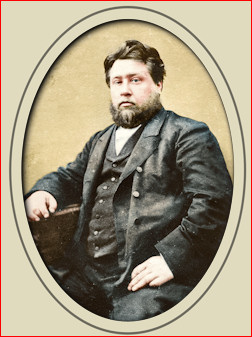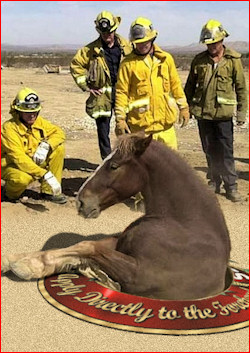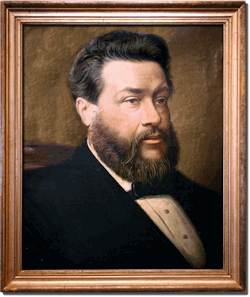by Dan PhillipsThe Christmas story doesn't really start with wise men nor shepherds. It does not begin with Gabriel's announcement to the young virgin, nor his earlier word to old Zechariah.

Its real origins lie far back in the days of eternity. Infinitely intelligent, wise and powerful beyond all imagining, the triune God conceived the entire plan that hinges on Christmas before He had lit a single star or spun a single planet. Never caught by surprise, God's masterful and intricate plan repeatedly surfaces throughout the pages documenting the thousands of years of Old Testament history and prophecy.
The first specific glimmer twinkles at the first fall of gloomy darkness.

Eve and her idiot husband had just done the most foolish thing a couple can ever do: they had opposed their judgment to God's judgment. She had been a fool, and he'd trotted along like a moronic puppy.
Of course, they had lost, in their fools' gambit; worse, they
were lost, and God read them the riot act.
But amid God's announcement of the woes they'd brought on themselves and their children comes this word, spoken to the Serpent who had fooled Eve into rebelling:
I will put hostility between you and the woman,
and between your seed and her seed.
He will strike your head,
and you will strike his heel (Genesis 3:15 CSB)
Odd phrase, that: "
her seed." The
seed properly is what the
man contributes to the birth of a child, and then it is used of the child so conceived, singularly and collectively. But in the hundreds of chapters and tens of thousands of words in the Old Testament,
"her seed" never occurs again. It means...
something, surely. But, at this first read, we're not sure
what.
However, we do know that this theme of the
seed keeps popping up throughout the Old

Testament. God clearly is up to something. This is the outworking of some plan.
When
all of the race has gone bad in Genesis 6, God wipes them all out — all except
one family of
one man, righteous Noah.
Three sons are born to Noah, but Shem is the
one singled out as chosen by God for a relationship (Genesis 9:26). Shem has
many sons, but only
one named Abram is isolated as the one in whom all the families of the earth will be blessed (Genesis 12:3). In Abram, and in his
seed (Genesis 22:18).
The years roll by, and the narrowing continues. Abram has
two sons, but Isaac is the
one dubbed his "seed" (Genesis 21:12).
Two sons are also born to Isaac, and it is the
younger one, Jacob, who continues the line of the blessed Seed (Genesis 28:13-14). Jacob then has
twelve sons. Which of them will continue this line? So much space is given to Joseph of the technicolored dreamcoat that we might think it is he - except that God identifies Judah as the
one son who will produce the line of kingship (Genesis 49:10).
And here's one more clue for us:
each of these moves involves a miraculous birth, a birth involving an act of God. How so? Every one of these matriarchs is
infertile. Abraham's wife Sarah is infertile (Genesis 11:30), and so are Isaac's wife Rebekah (Genesis 25:21), and Jacob's wives Rachel and Leah (Genesis 29:31; 30:22). So we keep hearing that faint ringing of the bell, associating something remarkable with births in the line of the
woman's Seed.
Are we given any help as to which of the thousands of children descended from Judah will be the line of the delivering, ruling, blessing, conquering Seed? Indeed we are, and we'll single out two.
First, around 1000 BC, Judah's grandson King David gets the news that he will never lack a son to sit on his throne, which is thereby guaranteed to his seed (2 Samuel 7:14). Of the thousands of Judah, that family is the
one through whom the kingly Seed will come.
Then some three centuries later the house of David is told that a virgin would conceive and bear a Son, whose name would be God-with-us (Isaiah 7:14). Ah, now — the mystery is both solved and deepend! What would be remarkable about the Seed's birth? He really would be "
her Seed," the seed of a woman
without the normal participation of a husband. His origins would be from God.
That was why He would be named God-with-us; because He would actually be God in human flesh, as we further learn in Isaiah 9:6 —
For to us a child is born, to us a son is given;
and the government shall be upon his shoulder,
and his name shall be called Wonderful Counselor, Mighty God,
Everlasting Father, Prince of Peace.

So there, you see, is just a
bit of what is behind the lovely story of the girl and the star and the shepherds and the angels. More importantly, this is why Heaven itself was so excited at the Child's birth, that no less than the Chief Angel was sent to announce it; and that is why Heaven emptied out to pour out its joy and praise, lighting up the darksome Mediterranean sky that night (Luke 2:13-14).
It wasn't just a story or an isolated event, like some bright fleck of confetti. It was part of an
eternal plan, devised in the heart and mind of the infinite-personal God of Scripture. It was God's plan for the rescue of our fallen, lost, helpless race.
We were so far from God, so alienated and hostile, that no less of a measure could redeem us. We had had laws, examples, warnings and promises. None had worked!
The problem wasn't the laws; the problem was
us. We were estranged rebels under God's judgment from the start and in the middle, and we still were. Nothing coming
from us could save us, because
we were the source and focus of the problem. We needed an extraordinary intervention from outside of us, from God Himself.
We didn't need to be merely instructed or improved. We needed to be
saved.That is
exactly what Christmas was all about.
On Christmas, God the Son was born a man, and given the name
Jesus — which means
salvation. Jesus lived as a man, obeying God perfectly from the heart as none of Adam's natural sons had done. Jesus spoke God's words, and did God's deeds of power over the natural world and the spiritual world.
How did we respond? Our highest representatives in the sacred and secular realms hated Him, rejected Him, misjudged Him, condemned Him, and crucified Him. He died the death of a guilty man under God's judgment — though He had never done anything but the good and the righteous.
In that bloody death, Jesus fully satisfied the justice of God, by taking the place of lost sinners. Then Jesus rose from the dead, and ascended to the Father's right hand. One day Jesus will come to rule from David's throne, just as promised.
This is the Child of Christmas, no longer a babe in a feeding-trough: Jesus Christ,
the woman's conquering Seed, the Son of David, God with us, the Savior.
Where does this leave you, then? Maybe now you know more than you once did. If so, that is wonderful.

But Herod knew all this, and he
hated the Christ, and wanted nothing to do with Him. The religious leaders couldn't be bothered with Him. The politicians couldn't be rid of Him quickly enough.
It was the simple shepherds, and the foreign magi, who came to worship Him.
In which group do you stand?
Let us take our place by their side, marveling and wondering, believing and adoring. Let us worship God come in the flesh for our salvation: Jesus Christ, the true and only celebrity of Christmas.

 by Frank Turk
by Frank Turk








 t TimesOnline, avowed atheist Matthew Parris writes
t TimesOnline, avowed atheist Matthew Parris writes  Travelling in Malawi refreshed another belief, too: one I've been trying to banish all my life, but an observation I've been unable to avoid since my African childhood. It confounds my ideological beliefs, stubbornly refuses to fit my world view, and has embarrassed my growing belief that there is no God.
Travelling in Malawi refreshed another belief, too: one I've been trying to banish all my life, but an observation I've been unable to avoid since my African childhood. It confounds my ideological beliefs, stubbornly refuses to fit my world view, and has embarrassed my growing belief that there is no God.
 ossibly there is someone, on this last Sunday night of another year, who is saying to himself, "I hardly know why I came here, for I have been everything that I ought not to have been, and nothing that I ought to have been."
ossibly there is someone, on this last Sunday night of another year, who is saying to himself, "I hardly know why I came here, for I have been everything that I ought not to have been, and nothing that I ought to have been."






 When the angels went away from them into heaven, the shepherds said to one another, "Let us go over to Bethlehem and see this thing that has happened, which the Lord has made known to us." And they went with haste and found Mary and Joseph, and the baby lying in a manger. And when they saw it, they made known the saying that had been told them concerning this child. And all who heard it wondered at what the shepherds told them. But Mary treasured up all these things, pondering them in her heart. And the shepherds returned, glorifying and praising God for all they had heard and seen, as it had been told them.
When the angels went away from them into heaven, the shepherds said to one another, "Let us go over to Bethlehem and see this thing that has happened, which the Lord has made known to us." And they went with haste and found Mary and Joseph, and the baby lying in a manger. And when they saw it, they made known the saying that had been told them concerning this child. And all who heard it wondered at what the shepherds told them. But Mary treasured up all these things, pondering them in her heart. And the shepherds returned, glorifying and praising God for all they had heard and seen, as it had been told them.


 f God knows the future with certainty, then the future is (by definition) already predetermined. If tomorrow is predetermined and you don't want to acknowledge that the plan was decreed by God, you have only two choices:
f God knows the future with certainty, then the future is (by definition) already predetermined. If tomorrow is predetermined and you don't want to acknowledge that the plan was decreed by God, you have only two choices:

 inda speaks for itself:
inda speaks for itself: fear there are times coming when the minister will not be true to his duty unless he goes further, and preaches Christ as the sole King of the Church.
fear there are times coming when the minister will not be true to his duty unless he goes further, and preaches Christ as the sole King of the Church. There has been a disposition on the part of the state, especially with regard to the Free Church of Scotland, to exercise power and judgment over church decrees. No king, no queen that ever lived, or can live, has any authority whatever over the church of Christ. The church has none to govern and rule over her but her Lord and her King.
There has been a disposition on the part of the state, especially with regard to the Free Church of Scotland, to exercise power and judgment over church decrees. No king, no queen that ever lived, or can live, has any authority whatever over the church of Christ. The church has none to govern and rule over her but her Lord and her King.









 Listen: I think it's ironic that Newsweek took a week out of the Advent season to say exactly the opposite in making an editorial case for a religious view of Gay "marriage". In doing so, they have done exactly the opposite of making straight a path for this Jesus.
Listen: I think it's ironic that Newsweek took a week out of the Advent season to say exactly the opposite in making an editorial case for a religious view of Gay "marriage". In doing so, they have done exactly the opposite of making straight a path for this Jesus.








